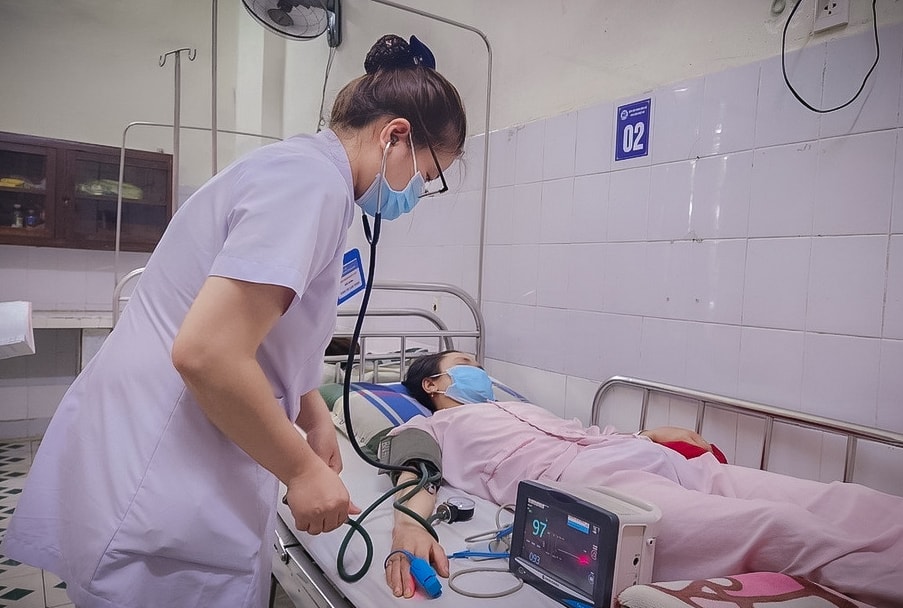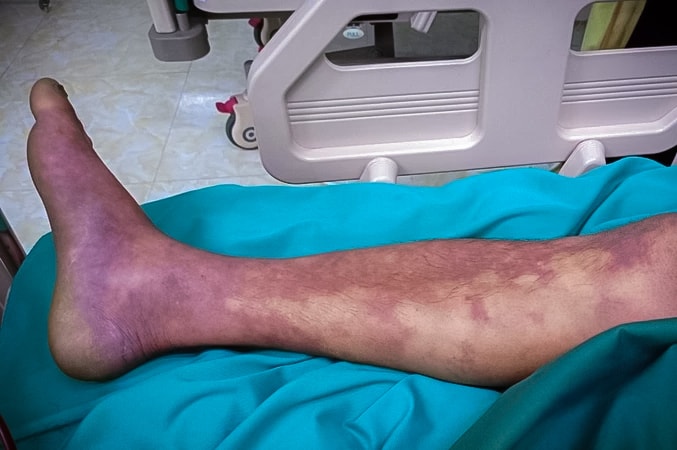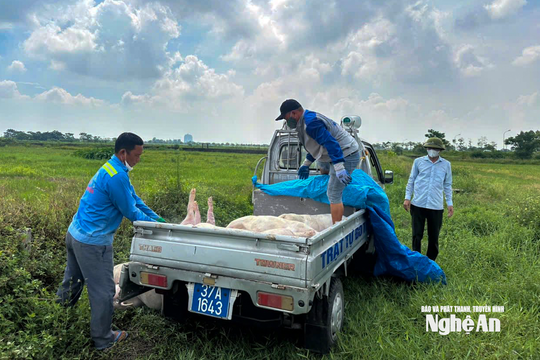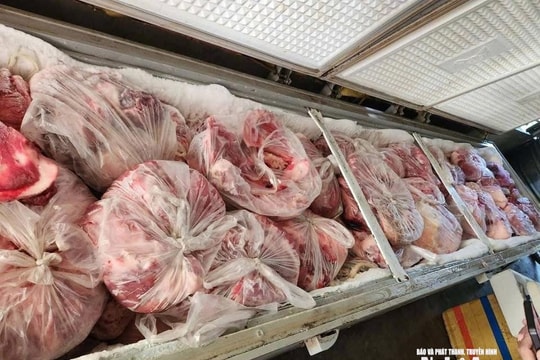Nghe An General Hospital's doctor warns about streptococcus suis disease
According to the report of the Ministry of Health's infectious disease surveillance system, since the beginning of the year, many localities have recorded an increase in cases of streptococcus suis infection in humans.
Increased human cases of streptococcal infection
In Hue city, from the beginning of the year to July 14, 37 cases of streptococcus suis were recorded. Of all the cases, 1 died and 3 were seriously ill.
In Hung Yen province, on July 15, the Department of Health of this province established two working groups to verify information that some people ate blood pudding and pig intestines at three restaurants in Dong Ky village (Quynh An commune) suspected of being infected with streptococcus suis bacteria, causing six people to be hospitalized, of which two died.

In Hanoi, the first death due to Streptococcus suis this year has just been recorded. Since the beginning of the year, Hanoi has recorded 7 cases of infection, 1 death, equivalent to the same period last year.
LIVENghe An, although there are no statistics yet, according to the Center for Tropical Diseases, Nghe An General Hospital, the number of cases of streptococcus suis is approximately 10, an increase compared to the same period in 2024. Of which, there is 1 severe case, the family asked to go home; another case had to be transferred to Hanoi for treatment. The cases occurred sporadically, not concentrated.
Streptococcus suis (S. suis) is a zoonotic disease that can be fatal.S.suis is found in many places around the world where pigs are raised. The rate of asymptomatic S.suis carriage in a pig herd is about 60-100%. S.suis bacteria usually reside in the upper respiratory tract, especially in the nose, in the digestive tract and genitals of pigs.
Faced with this situation, recently, the Department of Disease Prevention, Ministry of Health has sent an official dispatch to the Directors of Health Departments of provinces and centrally run cities on strengthening the prevention and control of swine streptococcus disease to humans.

The Department of Disease Prevention requested the Directors of the Department of Health of provinces and cities to strengthen monitoring, early detection of suspected cases of Streptococcus suis infection in humans, and immediately deploy measures to handle outbreaks.
Medical examination and treatment facilities should pay special attention to cases of patients with symptoms suspected of being infected with Streptococcus suis, exploiting the epidemiological history and taking samples for testing to treat patients promptly to avoid death and notify the Center for Disease Control to investigate and handle the outbreak.
Closely coordinate with veterinary agencies in monitoring and detecting diseases.pandemicon pig herds, especially diseases that are favorable for streptococcus suis outbreaks such as blue ear disease, promptly share information to have measures to prevent the risk of infection to humans...
Strengthen communication on mass media and to households about measures to prevent Streptococcus suis infection to humans and coordinate with the health sector and the Animal Husbandry - Veterinary sector to deploy measures to handle outbreaks according to regulations.

Disease prevention measures
Master, Doctor Bui Tien Hoan - Deputy Head of the Department of Viruses and Parasites, Center for Tropical Diseases, Nghe An General Hospital said: Streptococcus suis is transmitted from animals to humans through respiratory droplets; people come into contact with sick pigs or pigs carrying bacteria (bacteria enter the blood through small injuries and scratches on the skin); eating undercooked meat of sick pigs or pigs carrying bacteria...
Currently, there is no evidence that streptococcal disease can be transmitted directly from person to person; there is no vaccine against S. suis infection in humans.

Streptococcus suis in humans causes systemic infection, affecting several organ systems. Meningitis is the most common clinical manifestation. Clinical features of meningitis: High fever, headache, nausea, vomiting, tinnitus, deafness, stiff neck, impaired perception... various hemorrhages in several parts of the body. Including petechiae, purpura and ecchymoses, hemorrhagic bullae and skin necrosis.
The clinical features of Streptococcus suis disease progress very quickly. Therefore, most cases when they first appear only have fever and headache, so patients think it is a common cold and only go to private clinics and buy medicine to treat themselves. Therefore, when patients come to medical facilities for treatment, they are already in pre-shock, septic shock, multiple organ failure, and must be placed on a ventilator and combined with blood filtration.
The treatment of Streptococcus suis in humans is mainly with antibiotics and is carried out according to the Ministry of Health's protocol. The cases are cured, more or less leaving sequelae. Common sequelae are deafness, organ failure, kidney and liver failure, and long-term health effects.

Master, Doctor Bui Tien Hoan also warned: The characteristic of streptococcus suis bacteria is that it can live for more than 3 months in an environment with a temperature below 0 degrees Celsius; at a temperature of 20-25 degrees Celsius, it can live for 8 days; and is destroyed at 70 degrees Celsius or higher. Therefore, everyone must eat cooked food, drink boiled water, and eat thoroughly cooked food; do not eat pig blood pudding or foods made from pigs that have not been cooked.
People involved in pig farming and slaughtering need to have safety protection such as wearing masks and gloves. People living in areas where pigs die from disease also need to take preventive measures such as properly destroying pigs; spraying disinfectants, disinfecting barns and the environment.
TO PREVENT STREPTOCOCCAN DISEASE:
- Do not slaughter or consume sick or dead pigs.
- Practice food hygiene, do not eat undercooked pork or pork organs; do not eat raw pork blood pudding and other raw or undercooked pork products that do not meet food safety standards. Consumers should only buy pork that has been quarantined by veterinary agencies.
- Use protective equipment such as gloves, boots, eye protection; wash hands with soap before and after caring for, slaughtering, and processing pork, especially when handling sick or dead pigs.
- When there are open wounds or damaged skin areas, do not slaughter pigs or process fresh pork; or if there are, the wound must be covered before contact and disinfectant must be used after work.
- Use clean soap to wash care, slaughtering and kitchen utensils immediately after use.
- Practice good veterinary hygiene, ensure the environment of pig and livestock farming areas is clean, airy, compost manure to kill pathogens; do not buy, sell, or transport infected pigs from disease-endemic areas to other areas.
- People who have suspected symptoms of the disease such as sudden high fever and a history of caring for, slaughtering sick or dead pigs or eating unsanitary pig products need to immediately go to a medical facility for examination, treatment and timely handling.
Master, Doctor Bui Tien Hoan - Deputy Head of Virus and Parasitology Department, Tropical Disease Center, Nghe An General Hospital






